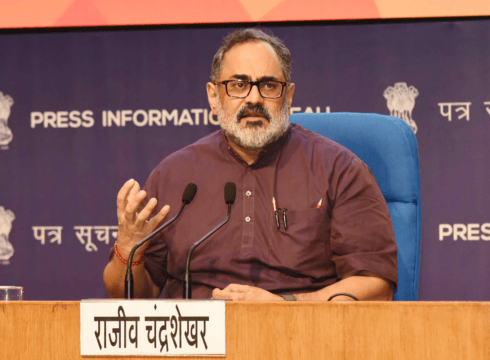The IT Ministry warned X, YouTube and Telegram that non compliance with the orders will entail strict action, including withdrawal of safe harbour protections
MoS Rajeev Chandrasekhar said there will be zero tolerance for criminal and harmful content on the Indian internet
Implement proactive measures, including content moderation algorithms and reporting mechanisms, to curb the dissemination of such content, the Centre said
Inc42 Daily Brief
Stay Ahead With Daily News & Analysis on India’s Tech & Startup Economy
The Ministry of Electronics and Information Technology (MeitY) has issued notices to multiple social media platforms to remove child sexual abuse material (CSAM) on their websites.
The ministry has sent the notices to X, formerly Twitter, Telegram and YouTube. It has warned that non compliance with the order will entail strict action, including withdrawal of safe harbour protections.
“We have sent notices to X, Youtube and Telegram to ensure there are no Child Sexual Abuse Material that exist on their platforms… If they do not act swiftly, their safe harbour under section 79 of the IT Act would be withdrawn and consequences under the Indian law will follow,” said Minister of State (MoS) for Electronics and Information Technology Rajeev Chandrasekhar said, as per The Economic Times.
Failure to take down the said content would be deemed a breach of Rule 3(1)(b) and Rule 4(4) of the IT Rules, 2021, the ministry said in a statement. MeitY also noted that the notices served to the social media platforms emphasise the ‘importance of prompt and permanent removal or disabling of access to any CSAM on their platforms’.
The government has also directed the platforms to implement proactive measures, including content moderation algorithms and reporting mechanisms, to curb the dissemination of content related to child sexual abuse in the future.
Chandrasekhar also said that there will be zero tolerance for criminal and harmful content on the Indian internet.
It is pertinent to note that IT Act, 2000 provides a legal framework to curb pornographic content, including CSAM. Under the Act, sections 66E, 67, 67A, and 67B mention stringent penalties and fines for the online transmission of pornographic content.
This is the latest round of ban on pornographic content by Indian authorities. In September last year, the Department of Telecommunications (DoT) directed internet service providers (ISPs) to immediately block access to 67 porn websites. Prior to that in 2018, the Centre blocked access to 827 porn websites on the orders of the Uttarakhand HC.
In addition, there have been numerous instances of authorities directing social media platforms, especially YouTube, to ban video channels and handles for being detrimental to national security, issues related to public order and for spreading fake news.
The new orders come at a time when X has already been embroiled in a legal saga with the Centre over some takedown orders. While social media platforms are required by law to submit a monthly compliance report on crackdown on CSAM, the new orders further reinforce the Centre’s crackdown on these platforms.
{{#name}}{{name}}{{/name}}{{^name}}-{{/name}}
{{#description}}{{description}}...{{/description}}{{^description}}-{{/description}}
Note: We at Inc42 take our ethics very seriously. More information about it can be found here.


